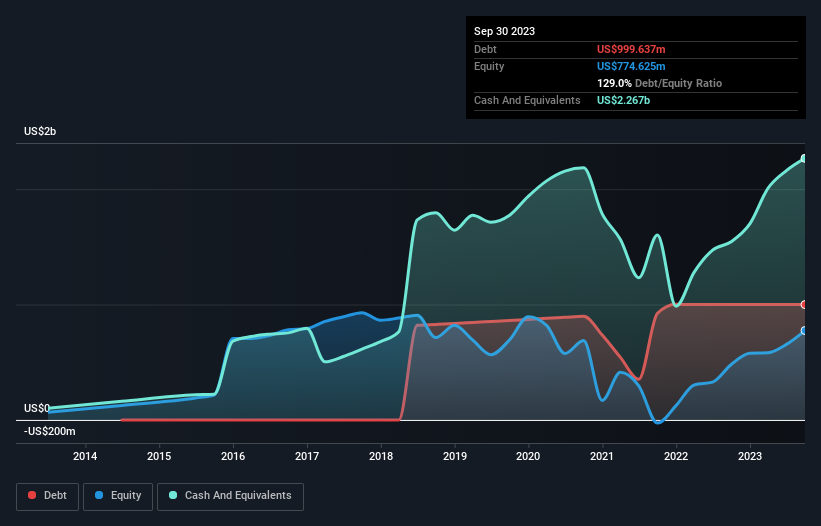- United States
- /
- Software
- /
- NasdaqGS:TEAM
Atlassian (NASDAQ:TEAM) Has Debt But No Earnings; Should You Worry?
Legendary fund manager Li Lu (who Charlie Munger backed) once said, 'The biggest investment risk is not the volatility of prices, but whether you will suffer a permanent loss of capital.' So it seems the smart money knows that debt - which is usually involved in bankruptcies - is a very important factor, when you assess how risky a company is. Importantly, Atlassian Corporation (NASDAQ:TEAM) does carry debt. But the real question is whether this debt is making the company risky.
When Is Debt A Problem?
Debt and other liabilities become risky for a business when it cannot easily fulfill those obligations, either with free cash flow or by raising capital at an attractive price. In the worst case scenario, a company can go bankrupt if it cannot pay its creditors. However, a more frequent (but still costly) occurrence is where a company must issue shares at bargain-basement prices, permanently diluting shareholders, just to shore up its balance sheet. Of course, plenty of companies use debt to fund growth, without any negative consequences. The first thing to do when considering how much debt a business uses is to look at its cash and debt together.
View our latest analysis for Atlassian
How Much Debt Does Atlassian Carry?
As you can see below, Atlassian had US$999.6m of debt, at September 2023, which is about the same as the year before. You can click the chart for greater detail. But on the other hand it also has US$2.27b in cash, leading to a US$1.27b net cash position.

How Healthy Is Atlassian's Balance Sheet?
Zooming in on the latest balance sheet data, we can see that Atlassian had liabilities of US$1.91b due within 12 months and liabilities of US$1.40b due beyond that. Offsetting these obligations, it had cash of US$2.27b as well as receivables valued at US$368.3m due within 12 months. So its liabilities outweigh the sum of its cash and (near-term) receivables by US$669.6m.
Having regard to Atlassian's size, it seems that its liquid assets are well balanced with its total liabilities. So while it's hard to imagine that the US$63.9b company is struggling for cash, we still think it's worth monitoring its balance sheet. While it does have liabilities worth noting, Atlassian also has more cash than debt, so we're pretty confident it can manage its debt safely. When analysing debt levels, the balance sheet is the obvious place to start. But ultimately the future profitability of the business will decide if Atlassian can strengthen its balance sheet over time. So if you want to see what the professionals think, you might find this free report on analyst profit forecasts to be interesting.
In the last year Atlassian wasn't profitable at an EBIT level, but managed to grow its revenue by 24%, to US$3.7b. With any luck the company will be able to grow its way to profitability.
So How Risky Is Atlassian?
While Atlassian lost money on an earnings before interest and tax (EBIT) level, it actually generated positive free cash flow US$930m. So taking that on face value, and considering the net cash situation, we don't think that the stock is too risky in the near term. The good news for Atlassian shareholders is that its revenue growth is strong, making it easier to raise capital if need be. But that doesn't change our opinion that the stock is risky. When analysing debt levels, the balance sheet is the obvious place to start. But ultimately, every company can contain risks that exist outside of the balance sheet. For example - Atlassian has 2 warning signs we think you should be aware of.
Of course, if you're the type of investor who prefers buying stocks without the burden of debt, then don't hesitate to discover our exclusive list of net cash growth stocks, today.
New: Manage All Your Stock Portfolios in One Place
We've created the ultimate portfolio companion for stock investors, and it's free.
• Connect an unlimited number of Portfolios and see your total in one currency
• Be alerted to new Warning Signs or Risks via email or mobile
• Track the Fair Value of your stocks
Have feedback on this article? Concerned about the content? Get in touch with us directly. Alternatively, email editorial-team (at) simplywallst.com.
This article by Simply Wall St is general in nature. We provide commentary based on historical data and analyst forecasts only using an unbiased methodology and our articles are not intended to be financial advice. It does not constitute a recommendation to buy or sell any stock, and does not take account of your objectives, or your financial situation. We aim to bring you long-term focused analysis driven by fundamental data. Note that our analysis may not factor in the latest price-sensitive company announcements or qualitative material. Simply Wall St has no position in any stocks mentioned.
About NasdaqGS:TEAM
Atlassian
Provides a collaboration software that enables organizations to connect all teams through a system of work that unlocks productivity at scale worldwide.
Flawless balance sheet with high growth potential.
Similar Companies
Market Insights
Community Narratives



